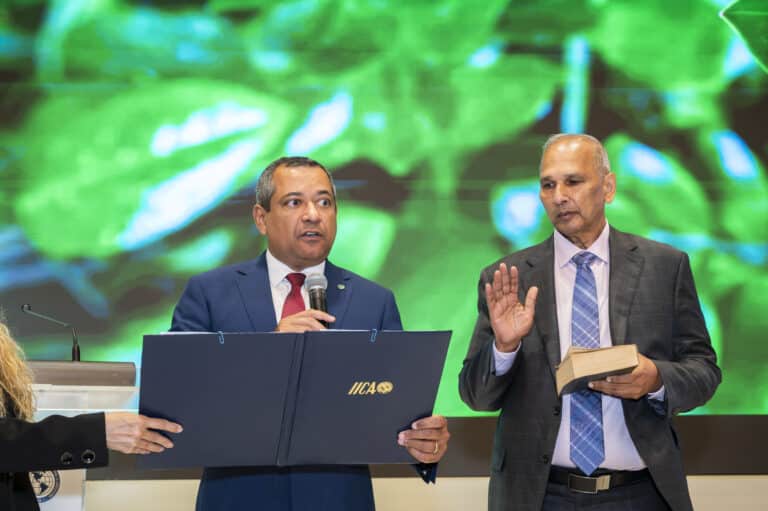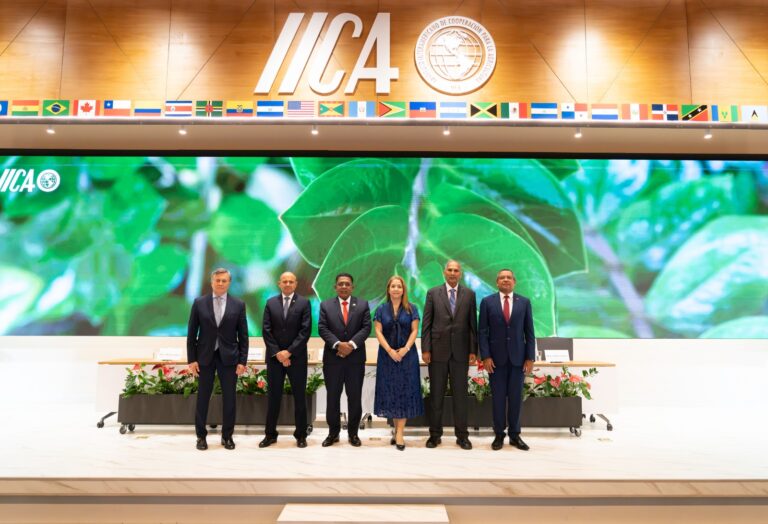The results of the PRESICA project, which promoted the creation of innovation networks in countries of the region, included new varieties and crop and postharvest management technologies.
San Jose, Costa Rica, September 11, 2014 (IICA). The main results of an innovation project carried out by the Inter-American Institute for Cooperation on Agriculture (IICA) in Central America include the implementation of 38 technology validation and transfer initiatives designed to improve agricultural productivity and competitiveness, based on the creation of 22 local innovation consortia in the corn, bean, manioc and bell pepper chains.

Carried out with the national agricultural research institutes of Belize, Costa Rica, the Dominican Republic, El Salvador, Guatemala, Honduras, Nicaragua and Panama, the project was funded by the Inter-American Development Bank (IDB) and the Regional Fund for Agricultural Technology (FONTAGRO).
The technology validation and transfer initiatives are related to new varieties of seeds, agronomic crop management, organic methods for plant protection, and the use of postharvest and processing technologies and others that add value.
The project, Technological Innovation Strategy to Improve the Productivity and Competitiveness of Product Chains in Central America and the Dominican Republic (PRESICA) also designed 15 assessments and local plans for strengthening seed production systems, and supported business and market plans to stimulate small agricultural production enterprises.
In the eight countries in which PRESICA was implemented, producers, researchers, extension workers, agricultural processors and representatives of universities in the four agricultural chains were integrated into local innovation networks and consortia.
The project culminated with a Regional Meeting on Innovation in San Jose involving Costa Rica’s Deputy Minister of Agriculture and Livestock, José Joaquín Salazar; the Director General of IICA, Víctor M. Villalobos; the President of FONTAGRO, Rafael Pérez Duvergé; and representatives of the IDB, the World Bank, donors and international agricultural research organization, microenterprises and local innovation consortia.
“Technological innovation is important today to add value in agroindustry and improve the incomes and the quality of life of family farmers,” Salazar observed.
“PRESICA turned the pyramid on its head, to ensure that the involvement of producers and their needs is what brings about improvements in the management of institutions and agricultural research and innovation policies,” Villalobos pointed out.
“Central America and the Caribbean are faced with the challenges of making production more efficient and increasing inclusion in agricultural development. That calls for redoubled efforts and investments to transfer innovation to family agriculture,” the President of FONTAGRO remarked.
According to IICA specialist Galileo Rivas, innovation generates results and changes when people acquire knowledge, ideas, practices and technologies that bring economic and social benefits.
“In the case of family agriculture, innovation is achieved by means of processes that incorporate an area-based chains approach, promoting close coordination, participation and change among the actors in the chains concerned and attaching value to local knowledge,” Rivas commented.
The Regional Meeting on Innovation promoted the sharing of knowledge on innovation for development, in which the results of innovation are as important as the processes of generating ideas, learning and negotiation that make it possible to achieve them.
PRESICA and other similar IICA projects, such as the SICTA Network (with funds from Swiss cooperation) and PRIICA (financed by the European Union), promote the generation of agricultural innovations at the local level, based on the premise that networking facilitates the success of innovation processes.
“Although PRESICA concluded, there are initiatives aimed at giving continuity to, and scaling up, the technologies developed. These reflect the commitment of the national agricultural research institutes of Central America and the Dominican Republic to the approach, and of the local actors in the consortia,” noted IICA consultant Esteban López.
Más información:
galileo.rivas@iica.int











